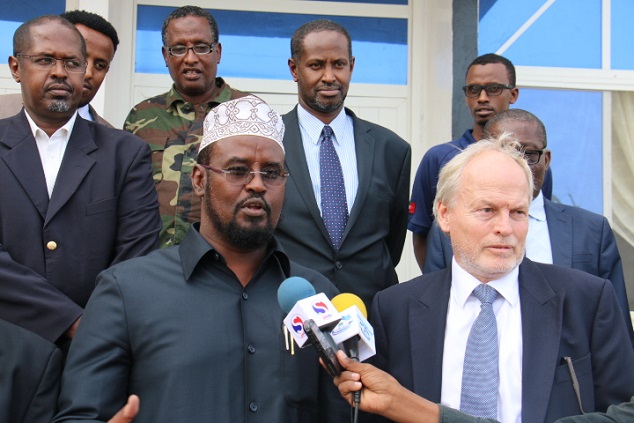Jubaland President rebuts claims of racket involving KDF

The leader of the semi-autonomous Jubaland region of Somalia has refuted claims of charcoal and sugar smuggling through the port of Kismayu, and stated that Kenyan soldiers have been unfairly accused of the trade.
Speaking during a press briefing in Nairobi on Friday President Ahmed Mohamed Islam pointed out that as far as he was concerned, there was no illegal trade of charcoal from Somalia or sugar into the lawless country through the port of Kismayu.
In a statement read on his behalf by the Permanent Secretary in the Office of the President Absir Mohamed, he indicated that KDF undertook its duties professionally and its presence in the country has contributed to peace and security.
“It is unfortunate that the report ‘Black and White’ authored by a British citizen is unaware of the Jubaland administration responsibility over the sea and airport in Kismayu. Further, it also fails to recognise the mandate and roles of AMISOM operations in Sector II and in the rest of the country,” he said.
He described the report as a fabrication and that nothing illegal was taking place in Jubaland.
“The report also alleges that my administration works hand in hand with KDF and Al Shabaab in the illegal business. It also accused the Kenya Defence Forces of engaging in illegal charcoal and sugar business, human rights abuses such as rape, torture, abduction and the killing of innocent civilians and livestock,” he stated.
He further said that there has been no mistreatment of its citizens there, raising questions as to the authenticity of the report.
“The very people said to be mistreated by KDF are supposedly my people, residents of Jubaland. It is interesting that my administration has not been made aware of such mistreatments. This disconnect raises questions about the truth of these claims,” he explained.
Mohamed was reacting to a report released Thursday which claimed that KDF soldiers are abetting the illegal trade with senior officials profiting from it.
“As far as I am concerned, KDF continues to be a professional force since its entry into Somalia in 2011 and its presence in Jubaland has contributed towards the peace and security we are currently enjoying,” he said.
He thanked the government, the people of Kenya and AMISOM troops for their support and sacrifice made to ensure that peace, security and stability are realised in Somalia.
“I also want to thank the KDF for the sacrifice and exemplary performance in Sector II specifically the liberation of more than 20 towns including Kismayu. Indeed, it has been a difficult task but through determination they succeeded and the Somali people will always be grateful to them,” he stated.
“This is not the first time that these issues of charcoal and sugar have been highlighted. In 2013, a UN report made similar false accusations without tangible evidence against KDF and my administration. Having read the report released yesterday, it is clear that it is a repetition of previously false reports and allegations and it offers nothing new,” he said.
The report alleged that Kenya’s army is involved in a Sh40 billion sugar smuggling racket in Somalia that also funds the Al-Qaeda militants it is supposed to be fighting.
The report is based on months of research conducted in Somalia and Kenya, including interviews with serving Kenyan officers, United Nations officials, Western intelligence sources, sugar traders, porters and drivers.
The report also accused Kenyan troops of “widespread” human rights abuses – including rape, torture and abduction – and conducting air strikes “targeting crowds of people and animals” rather than the militant training camps it claims to bomb.
Kenyan army spokesman, Colonel David Obonyo, denied the allegations, insisting Kenyan soldiers were fighting hard as part of the 22,000-strong African Union Mission in Somalia (AMISOM).
CapitalNews.co.ke